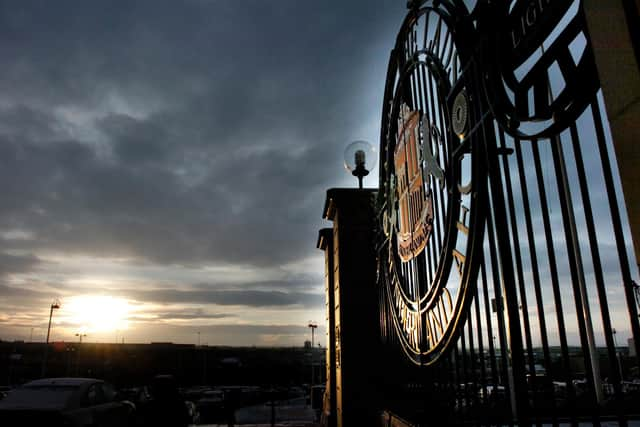The key conversations Sunderland and their League One rivals were having this week and what comes next
and live on Freeview channel 276
That was the moment in which for football, everything changed.
In line with government advice, clubs had planned to carry on as normal through the weekend but the knock-on effect was swift and considerable.
Advertisement
Hide AdAdvertisement
Hide AdIn a moment, the nation’s favourite game began to understand the scale of the crisis beginning to unfold.


League One clubs quickly began to assess the short and long-term repercussions and by the beginning of this week, the conversations had moved on quickly.
Initially, and understandably, the focus for many had been what would happen next.
Null and void? Resume later in the summer?
For most executives, though, the primary concern was financial.
Advertisement
Hide AdAdvertisement
Hide AdIt was clear that football would be in the backseat and quite rightly so. The EFL had postponed fixtures until April 3rd but the scale of the health crisis meant all could see this was merely an initial and sensible attempt to pause and take stock.
The health of the nation, players, fans and staff alike, was paramount, and so an extended break was going to be the only option.
Many, though, knew what this would mean for their club and many went as far as to raise concerns about the vialibity of their business and the potential impact on their staff.
This was two-fold.
One, clubs were instantly losing the gate revenue that is absolutely essential to their viability as a business.
Advertisement
Hide AdAdvertisement
Hide AdSecondly, this is a difficult time of year for clubs in terms of tax payments due to HMRC.
That was the initial and most pressing focus relayed to the EFL board as it met on Wednesday.
The reaction to that initial announcement was one of relief.
The EFL would advance all basic payments due for the rest of this season to clubs immediately, as a way of aiding the cash flow of clubs who had missed out on home fixtures.
Advertisement
Hide AdAdvertisement
Hide AdA loan facility was set up and the governing body vowed to help clubs seek support from the government, who had already confirmed that lower-league clubs would be eligible for the measures unveiled in a dramatic intervention on Tuesday night.
This, though, was a short-term relief.
Already, clubs are noting that while this will help them through the weeks ahead, it will not be enough should the delay be extended long into the summer.
Crucially, clubs are acutely aware that the season ticket renewals so vital to seeing them through the summer months could be affected.
This is the overriding concern that shapes the conversations that will take place about a return to action in the coming weeks.
Advertisement
Hide AdAdvertisement
Hide AdWhile a resumption at the start of May still seems highly unlikely, there is a desire to at least attempt a conclusion to the season before the end of June.
The problems this would solve are myriad.
It would mean key broadcasting deals are unaffected, the thorny issue of player contracts and loan deals expiring is avoided, and next season could have some element of normality.
As such, though it remains an option many want to be avoid, that the prospect of playing behind closed doors somewhere down the line has begun to be raised more frequently.
There is a clear ambivalence from all to the idea, but also a recognition that it could be ‘the lesser of two evils’.
How practical it is remains to be seen.
Advertisement
Hide AdAdvertisement
Hide AdWycombe, Rotherham and Peterborough are just three of the clubs to have recently had players in self-isolation.
There are likely to be more, not less, in the coming weeks.
Portsmouth Chief Executive Mark Catlin has spoken of trying to create a ‘clean’ environment for players so that they can train safely and effectively. However, his plans may have changed after it was confirmed three Pompey players had tested positive for coronavirus on Saturday morning.
To achieve this in a period long enough for all clubs to play would require a large amount of good fortune and an extensive testing programme, which currently does not look particularly feasible.
Catlin, in a measured address to his club’s supporters on Friday, admitted that for all the potential plans and ideas, there is an uncertainty that cannot be rectified for some time to come.
Advertisement
Hide AdAdvertisement
Hide AdMany of us have in our lifetimes never seen a week in which the fabric of society has been so utterly transformed.
Football is quite clearly not immune.
The situation changes every day and all ideas and plans being floated are done so with the acute recognition that they swiftly prove to be irrelevant.
It is too early to tell what shape this season and indeed the longer-term future of the league will be.
This dramatic week of planning is merely the start of a long and likely exhausting journey.
Advertisement
Hide AdAdvertisement
Hide AdAll planning is done with one thing in mind and it has been repeated, quite rightly, by fans, players, managers and chief executives.
Paul Warne summed it up best on Thursday, when asked how working to find a resolution to bring the season to a conclusion.
"Nothing is at all costs, so not if there are any serious health risks, no chance. Obviously football and sport is important, so it's really weird at weekends at the moment, but nothing comes at all costs,” he said.
"I appreciate that we're in an unbelievable position in the league and if we're not able to finish it I'd be disappointed, but not as disappointed as I would be if other things happened.”
Football, right now, comes a firm second.
